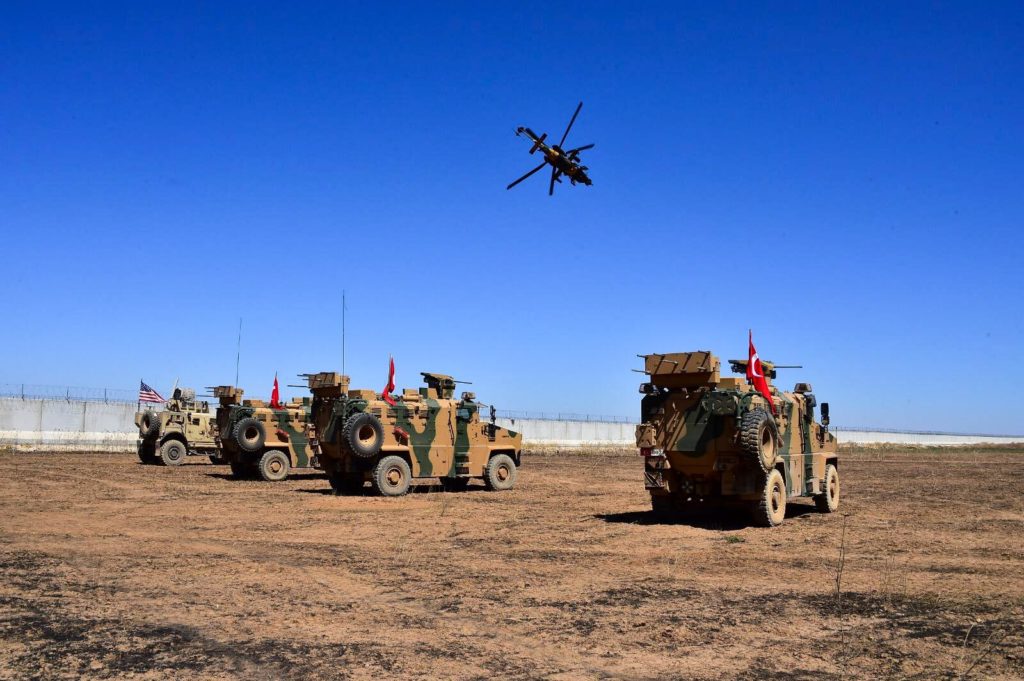U.S. President Donald Trump’s tacit approval for Turkey’s attack on Kurdish-led fighters in northeast in Syria vindicated European allies who have refused to send additional troops to the country as American forces drew down, a Western official told The Defense Post on Tuesday, October 8.
“It was a catastrophe waiting to happen,” the official said, speaking on the condition of anonymity because he was not authorized to speak on the matter.
After a phone call between Trump and Turkey’s President Recep Tayyip Erdogan on Sunday, the White House announced that the U.S. would not stand in the way of Ankara’s planned incursion into northeast Syria, even though the Turkish government has repeatedly made clear it intends to destroy the Western-backed People’s Protection Units, or YPG.
More than 70 countries have contributed to the U.S.-led international Coalition to defeat ISIS, which has fought alongside the SDF in northeast Syria. Turkey, also a Coalition member, has for months been threatening a military operation to clear the Kurdish-led fighters, whom it considers terrorists, from its southeastern border.
The U.S. withdrew between 50 and 100 Special Operations Forces from two outposts on the Syria-Turkey border shortly after the White House announcement, an administration official told reporters Monday. The YPG-led Syrian Democratic Forces released a statement Tuesday night saying that “all indications” suggest a Turkey-led attack is imminent.
Northeast Syrian leaders told The Defense Post that the White House announcement came as a shock, just days after the multi-ethnic region’s executive president Ilham Ahmed visited Washington seeking enduring American support.
And though the Trump administration reportedly did not warn Coalition allies such as the United Kingdom and France beforehand, some Western member nations were not surprised at the decision, the official said.
“Many of us have been hedging for this for a long time,” the official said. “We kind of knew Trump would eventually wake up and realize, hey, you haven’t pulled your forces out [of Syria].”
Trump first announced an imminent U.S. withdrawal in December 2018 after a previous phone call with Erdogan, sending State and Defense Department officials scrambling to negotiate a deal with Turkey to preserve the SDF and convince the U.S. president to change his mind.
“Last year it was possible to drag your feet,” the official said of U.S. officials’ efforts to slow-roll Trump’s withdrawal order. “But this time it’s even worse, because now Turkey was given the green light” to attack the SDF, he said.
Trump assured representatives of Coalition governments at a meeting in February that he would leave a residual U.S. force in Syria, partially reversing his December announcement, the official said.
Ambassador James Jeffrey, the U.S. Special Envoy to the Global Coalition Against ISIS and Washington’s point man on the crisis, set out over the following months to convince Coalition allies to send special forces to fill the gap as some American troops began withdrawing to placate Trump.
But the official said his government resisted State Department pressure to take the American president at his word.
“I told them, ‘No, we don’t trust your president,'” the official recalled. “We really don’t trust this project.”
After the White House announced Sunday it would allow a Turkish incursion, “I told our foreign minister, I’m really happy we’re not there,” the official said.
Other Coalition countries, including France and the U.K., quietly contributed additional special forces troops to northeast Syria after the December announcement, the official said.
Those troops depend on U.S. logistical support and are likely to leave if and when American forces withdraw, according to the official.
Trump said on Monday that the U.K. was “thrilled” with his decision to allow the Turkish incursion. “As you know they have soldiers over there also,” the U.S. president said.
“We have no idea where that came from,” foreign office Minister Andrew Murrison told parliament on Tuesday.
The Western official said Jeffrey has defended Trump’s latest decision in recent conversations with Coalition allies, and that the American envoy appears keener to rescue Washington’s relationship with Ankara than to preserve the Kurdish-led fighters.
Jeffrey did not respond to requests for comment.
“I’ve been wondering since last year how he can look himself in the mirror,” the official said.



